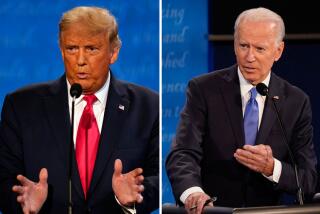Bush Cuts ABA Role in Vetting Judge Prospects
- Share via
WASHINGTON — President Bush decided Thursday to discontinue a half-century tradition in which presidents have relied on the American Bar Assn. for advice on potential candidates for federal judgeships, concluding that it is unfair to give “any single group such a preferential, quasi-official role.”
Bush’s chief counsel, Alberto R. Gonzales, told the head of the nation’s main organization of lawyers that the administration would not give the names of people under consideration for the U.S. courts to the ABA before forwarding them to the Senate for confirmation.
In a telephone conversation and subsequent letter, Gonzales told ABA President Martha Barnett that administration officials would consider the views of the ABA along with those of other groups. But in a major change, the association will get the names only as the president makes his selections public.
The question is not whether the ABA’s voice should be heard in the judicial selection process but whether it “should play a unique, quasi-official role and thereby have its voice heard before and above all others,” Gonzales wrote.
The decision, which White House officials had foreshadowed for nearly a week, delighted key congressional Republicans and other conservatives, who have contended for years that the ABA has a liberal orientation that tinges its ratings of judicial candidates.
“It’s high time that the White House sent the ABA packing,” said Clint Bolick, litigation director of the Institute for Justice, a libertarian public interest law firm.
But congressional Democrats and liberal organizations said the absence of early vetting by the ABA would erode the caliber and independence of the federal bench.
“The Bush administration’s action doesn’t make any sense except as a political favor to the right wing,” said Ralph G. Neas, president of People for the American Way.
The ABA denounced the decision. Its evaluation “provides a buffer from partisanship and a buffer from political patronage,” Barnett said at a news conference.
The ABA, which represents more than 40,000 lawyers, began to critique candidates for the federal judiciary, from district courts to the Supreme Court, in 1948 when the Senate asked for its help.
More to Read
Sign up for Essential California
The most important California stories and recommendations in your inbox every morning.
You may occasionally receive promotional content from the Los Angeles Times.












